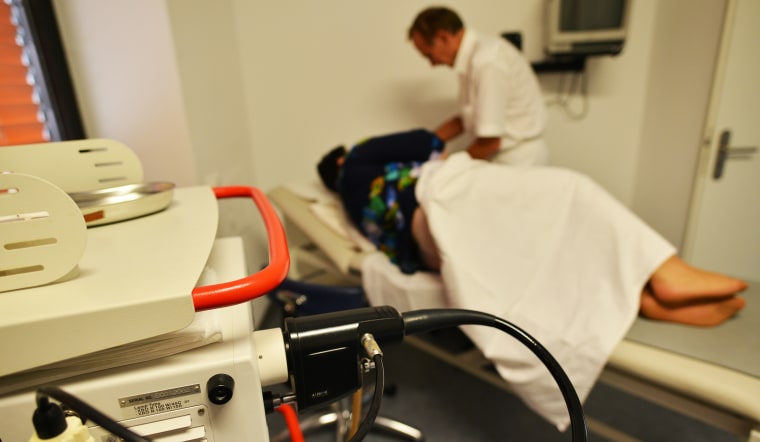When it comes to colon cancer screening, an annual stool test may be as effective as colonoscopy for people who don’t have risk factors for the disease, a new study suggests.
Researchers analyzed data from 31 studies that included more than 120,000 average risk patients who had a stool test and then a colonoscopy. They determined that the fecal immunochemical test — or FIT — is sufficient to screen for colon cancer, according to the report published Monday in the Annals of Internal Medicine.
The FIT is designed to detect the protein hemoglobin, which is found in red blood cells. People who test positive with the FIT need to get a colonoscopy to determine whether they have cancer or pre-cancerous lesions. But those who test negative only need to keep getting the FIT each year to make sure they don’t develop colon cancer.
“This non-invasive test for colon cancer screening is available for average risk people," said the study’s lead author, gastroenterologist Dr. Thomas Imperiale, an investigator at the Regenstrief Institute in Indianapolis. "They should discuss with their providers whether it is appropriate for them.”
According to Imperiale, average risk means a person has:
- no family history of colorectal cancer.
- no personal history of inflammatory bowel disease.
- no previous colon cancer or detected pre-cancerous polyps.
FIT is done at home by the patient and sent to a lab for evaluation.
The one downside to the at-home stool test is that it needs to be done yearly. But if used each year, the test is good enough to catch the vast majority of cancers, Imperiale said.
Switching to the FIT from colonoscopy for average risk patients without symptoms would bring colon cancer screening more in line with other cancer screens, such as mammography and PAP smears because, like them, it’s non-invasive, Imperiale said.
Though rare, colonoscopy can result in serious complications, such as a perforation of the colon, which occurs in about one in 1,000 cases, Imperiale said. Performing the FIT comes with very little risk.
Many patients experience fear and anxiety before undergoing colonoscopy, which may result in negative experiences. Some doctors believe that having FIT as an option might result in more people getting screened for colon cancer. Currently, 35 percent of people who should receive colonoscopies don't, the researchers noted.
FIT may also be a better option for screening people under age 50, the currently recommended age for colonoscopy. Recent studies have shown that colon cancer is striking younger and younger people and in response, the American Cancer Society has suggested lowering the age for a first colonoscopy to 45.
Despite that recommendation, it’s unlikely that any insurer will pay for a colonoscopy for younger patients, Imperiale said. For those patients, “using FIT to screen makes sense: it is zero risk from the test itself, is non-invasive, inexpensive, and will detect at least three of four cancers in the first application,” he added.
FIT is an excellent option for colon cancer screening only if it is performed consistently on a yearly basis.
In the study, Imperiale and his colleagues determined that when the FIT was set to be more sensitive, the test caught 95 percent of cancers, but resulted in 10 percent false positives. At a less sensitive setting, the FIT caught 75 percent of cancers but had just 5 percent false positives.
But, by doing the test every year, things improve dramatically, bringing the detection rate after just two years very close to that of the more sensitive setting, Imperiale said
Experts cautioned that while the FIT was less invasive, patients might not follow recommendations to get tested each year.
“FIT is an excellent option for colon cancer screening only if it is performed consistently on a yearly basis,” said Dr. Felice Schnoll-Sussman, a gastroenterologist at NewYork-Presbyterian Hospital and Weill Cornell Medicine. “Colon cancer screening and its impact on decreasing rates of colon cancer is a preventative health success story, although we have a way to go to increase rates to our previous desired goal of 80 percent screened in the U.S. by 2018.”
FIT has the possibility to increase screening rates, “so long as we create the infrastructure to do so in a high-quality way,” Schnoll-Sussman said in an email.
Dr. Robert Schoen is also concerned that patients won’t follow through with testing yearly, but it still may be more efficient than getting a colonoscopy every ten years.
“We know that when we do a colonoscopy we won’t find anything in 60 percent or so of cases,” said Schoen, a professor of medicine and epidemiology and chief of gastroenterology at the University of Pittsburgh Medical Center. “That’s not very efficient.”
FIT seems to be working in countries like the Netherlands, Spain and France, Schoen said.
“They are all doing centralized FIT screening,” he added. “It’s a lot cheaper and still a very effective means of screening and that’s a good thing.”

